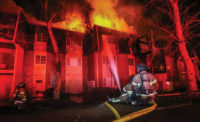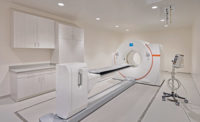Unfinished jobs, unpaid invoices, poor quality. These were just some of the headaches with drywall subcontractors that John Muter encountered when he joined a leading Raleigh-area general contractor in the late 1990s. Muter decided that the firm should start subbing more work to Precision Walls, a family-owned interiors specialist in nearby Cary.
Those headaches quickly became a thing of the past.
“From that point on, we had no drywall problems,” recalls Muter, who went on to start his own firm, Muter Construction, in 2012. And for the upstart’s first project, a town hall for Kenly, N.C., Muter knew having Precision Walls on his team would provide the needed comfort level essential for a successful debut job.
“You can’t stub your toe when you’re a small contractor,” he says.
Muter’s esteem for Precision Walls, ENR Southeast’s Specialty Contractor of the Year, is shared by other Southeast general contractors of all sizes, helping solidify the firm’s standing as one of the region’s go-to interior specialists. The current post-recession construction boom has been especially good for Precision Walls, which reported more than $229.22 million in regional revenue this year, up more than 40% from 2016.
A geographic footprint with 11 offices and more than 1,000 employees in the Carolinas, Tennessee and Virginia places Precision Walls in some of the region’s busiest markets. In the past year, the company has wrapped up several high-profile projects, including the $235-million UNC Rex Healthcare Heart & Vascular Hospital in Raleigh; the $200-million expansion and renovation of South Carolina’s Charleston International Airport; and Bridgestone Americas’ new 514,000-sq-ft, 30-story headquarters in downtown Nashville.
Brian Allen, who heads the company his parents founded in 1964, says that while the current robust economy has certainly benefited the balance sheet, the true credit goes to the people who have helped maintain a half-century-old commitment to stay within the company’s capabilities.
“We’ve never wanted to be the biggest firm,” Allen says, “but rather the one customers consider to be the best.” He adds that in each of the markets where the company operates, “we’ve found customers that share our culture and ethics, then [we] work to help them get repeat business.”
From Plans to Action
Precision Walls is also profiting from some prescient recession-era planning for the current business environment. Along with perfectly timing the opening of new locations in Charleston and Nashville with those region’s respective upticks in activity, the company’s leadership laid out a plan of specific goals in the areas of growth, productivity, customer satisfaction, quality and operational efficiency.
Allen notes that a major commitment to employee training has proven instrumental in achieving those goals, particularly for project managers.
“Before, it was baptism by fire,” he says. “Now our project managers are able to step in and run things right from the start.”
That emphasis on leadership development and retention makes a difference at a time when both experience and competence are highly coveted commodities. To clients such as Scott Duckworth, regional vice president of Brasfield & Gorrie, Raleigh, “It shows they care about the company, not just the job.”
Duckworth, who is currently working with Precision Walls on a 545,000-sq-ft patient care tower at Lexington Medical Center in Columbia, S.C., adds that the approach “speaks volumes for their commitment to do a good job and get better.”
Johnny Rankin, executive vice president of Balfour Beatty, Raleigh, likewise lauds Precision Walls’ consistently high degree of preparation.
“They bring ideas that will speed construction or result in a better end product, particularly for complex elements.”
– Johnny Rankin, Balfour Beatty
“They’re always mindful of their role in the project,” says Rankin. “They bring ideas that will speed construction or result in a better end product, particularly for complex elements like paneling frames or light wells.”
It’s hardly surprising that Precision Walls’ ongoing search for innovation made the company a relatively early adopter of prefabrication and other lean construction practices, including standardizing gang boxes and jobsite layouts and recycling material as much as possible to cut down on waste. Allen is also keeping a close watch on the evolution of other productivity-enhancing, waste-reducing techniques and technologies.
“I sometimes worry that we’re too leading edge,” he says of Precision Walls’ expertise in lean applications. “It’s definitely a journey.”
Yet he doesn’t discount the benefits lean has brought to Precision Walls’ projects, even if some of the general contractors they work for don’t use it.
“The key is to stay focused on it,” Allen says. “Otherwise, the practices will diminish.”
That’s particularly critical when it comes to safety. While lean’s emphasis on clean, organized workplaces helps lower injury risks, Allen still finds himself combating what he calls “the male-dominated” nature of construction.
“Most all of us were once little boys who never really got out of our habit of wanting to show how tough or cool we are,” he explains. “We continually stress in our meetings and training that it’s cool to keep yourself safe, and that whatever other priorities or pressures a job may have, nothing takes precedence over safety.”
In Pursuit of Good People
Keeping the workforce safe and productive are particularly critical at a time when skilled labor across the construction industry is at a premium, particularly for labor intensive work like drywall. Duckworth says GCs must closely monitor subcontractors’ backlogs to ensure they don’t get stretched. He’s had no such worries with Precision Walls, however.
“They are large enough and transparent with us to let us know what they can or cannot do,” Duckworth says. “We can trust that they have a plan to provide what we need. They also have the ability to react quickly and assign swing crews for weekend work if needed.”
To ensure Precision Walls can continue to live up to those expectations, Allen has stressed retention, especially at the entry level.
“We learned from exit interviews that some new people didn’t feel involved, which was the result of having each jobsite foreman responsible for training,” he explains.
Now, new Precision Walls employees spend a week at one of its three training centers to learn the firm’s culture and procedures. It also affords supervisors the opportunity to more fully assess the new employees’ skills—what they’re good at and what may require additional training.
Allen says taking a standardized approach to training has paid off in lower turnover rates, but it’s only one solution to a multifaceted challenge.
“It’s an issue we’re all dealing with, but just talking about it won’t help,” he says. “You just have to go out and recruit good people and do what you can to keep them.”
Precision Walls enjoys a rather diverse project slate that includes Vidant Health’s 418,000-sq-ft, 96-bed cancer patient tower in Greenville, N.C.; a new $154-million, 360,000-sq-ft headquarters for Charleston, S.C., technology firm Blackbaud; and the ongoing renovation of Greensboro, N.C.’s historic Revolution Mill into a retail and residential center.
Still, Allen is taking nothing for granted. While he expects the market to remain strong, Precision Walls is nevertheless planning to place itself in the strongest possible position if and when a downturn occurs.
Sticking with the practices they’ve used for more than 50 years will no doubt be the strategy’s keystone.
“We never have to worry about upset clients or bad quality” when using Precision Walls, Muter says. “They’re just a good bunch of people.”










Post a comment to this article
Report Abusive Comment